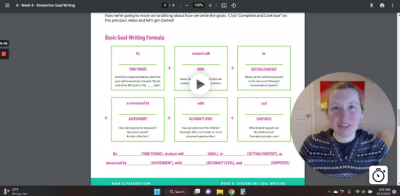Progress Monitoring for Speech Therapy:
How to Simplify Data Collection
Are you struggling to collect data to track progress on your students’ goals? Sarah and Lisa from SLP Toolkit are joining us on the #speechieshow to talk about progress monitoring! #speechieshow
Below are the links to the products that were talked about in the Speechie show:
- SLP Toolkit: https://www.slptoolkit.com/
If you’d rather listen to the audio version of the Speechie Show, click here:
Or if you prefer to read the transcript, see below:
Welcome to the Speechie Show! Being a speech language pathologist often means having too much work and not enough planning time. To beat the overwhelm, we’re bringing you the tricks and tools that will make your job a little bit easier.
Carrie: Hey everybody and welcome to the Speechie Show. I’m Carrie Clark and I am here today with Lisa and Sarah from SLP tool kit. How are you guys doing?
Lisa & Sarah: Good Hi. Hi Carrie, welcome.
Carrie: Welcome to the show. Ok if you guys are new to us, I am Carrie Clark from speechandlanguagekids.com and this is The Speechie Show. Every week we talk with a speech language pathologist about some topic of interest and we share a couple points, give you some awesome feedback and information that you can use right away. Then we share our favorite resources and do a giveaway. So, don’t forget to hang tight for the giveaway a little later. And today we are talking about progress monitoring. Which is the bane of existence of course school speech language pathologist’s.
Lisa & Sarah: It’s such a glamorous topic.
Carrie: It is. It’s so glamorous. So, we’re talking today about progress monitoring if you’re having trouble keeping up with it. If your report writing is taking forever because your progress monitoring is not, you know really where it needs to be. So, um while we are getting started here and getting some people on, if you are watching with us live, go ahead and type in yes or no to…are you using your time off to write progress notes? Do you have to use your time off for that? Or are you able to do it all during your work hour. So, we want to know kind of where everyone’s at. So, go ahead and type that into the comments. Yes, I am using my time off for report writing or no I am not. And while we are getting some comments in, Lisa and Sarah, why don’t you guys introduce yourself and tell us a little bit about SLP tool kit.
Lisa: I’m Lisa Kathman and I have been an SLP for about 20 years now which is crazy to me, but love the field so I’m still here.
Sarah: She’s started when she was 12.
Carrie: Haha, yes.
Sarah: She was a pioneer in our field. And I’m Sarah Bevier. I’ve been in the schools for about 8 years now. And solely have only ever worked in the schools. And that’s what I love. Elementary is typically where I’m at.
Carrie: Wonderful. And tell us a little bit about SLP tool kit. What do you guys have going on over there at SLPtoolkit.com?
Sarah: So this is a web app that we launched about a year ago. It was our baby that we build, um really to solve some problems that we experienced as school based SLP’s. And so primarily that was out focus. It would work for anybody who works with the pediatric population. But the idea was that we wanted to find a simpler way to measure progress. So, to make progress reports easier, and also to find a way to be able to collect data effectively when it was time for an annual review. So, that we have enough information on students so that we can be really confident with our data.
Carrie: Wonderful. So, you guys have been really diving in deep in the world of progress monitoring and what you can do to improve that over the last year then.
Lisa: Yes
Carrie: Wonderful. Excellent. So, we have some people chiming in here. Let’s see. We got a couple yes’s and a couple no’s on are you spending your time off writing progress reports. I’m glad that there are some people that aren’t…hahaha.
Sarah: We are too.
Carrie: But, I know that there’s a lot of you out there that are. Plus, even if you’re not using your time off, I know that those progress notes can really take up a lot of your work time as well. Ok so we’re going to go ahead and talk today about 5 tips that will help make your progress monitoring easier. And we’re going to take questions as we go along, so if you have any questions, go ahead and type those in. And don’t forget to like and share this on your own Facebook timeline and that will help us spread the word further and help more people with their progress monitoring. Ok so the first point we are going to talk about today is using criterion referenced tests to make your progress monitoring easier. Why don’t you guys talk to us a little bit about what that looks like.
Lisa: So a criterion reference test, if you’re not familiar with what that is, it’s just a test where you set the criteria for what you want the student to master by the end of the IEP year. So, you develop the test. You determine what you want the student to master. Maybe eight out of ten items or score 80% on that test and you are determining all of the criteria. So, the student is not measured against peers, they’re really measured against them self. You get a baseline on that test and then you want them to move to a certain point by the end of the year. And what’s so nice about using criterion…click here to read the full transcript.

About the Author: Carrie Clark, MA CCC-SLP
Hi, I’m Carrie! I’m a speech-language pathologist from Columbia, Missouri, USA. I’ve worked with children and teenagers of all ages in schools, preschools, and even my own private practice. I love digging through the research on speech and language topics and breaking it down into step-by-step plans for my followers. I graduated from Truman State University in Kirksville, MO with a masters degree in Communication Disorders.
Connect with Me:







Leave A Comment